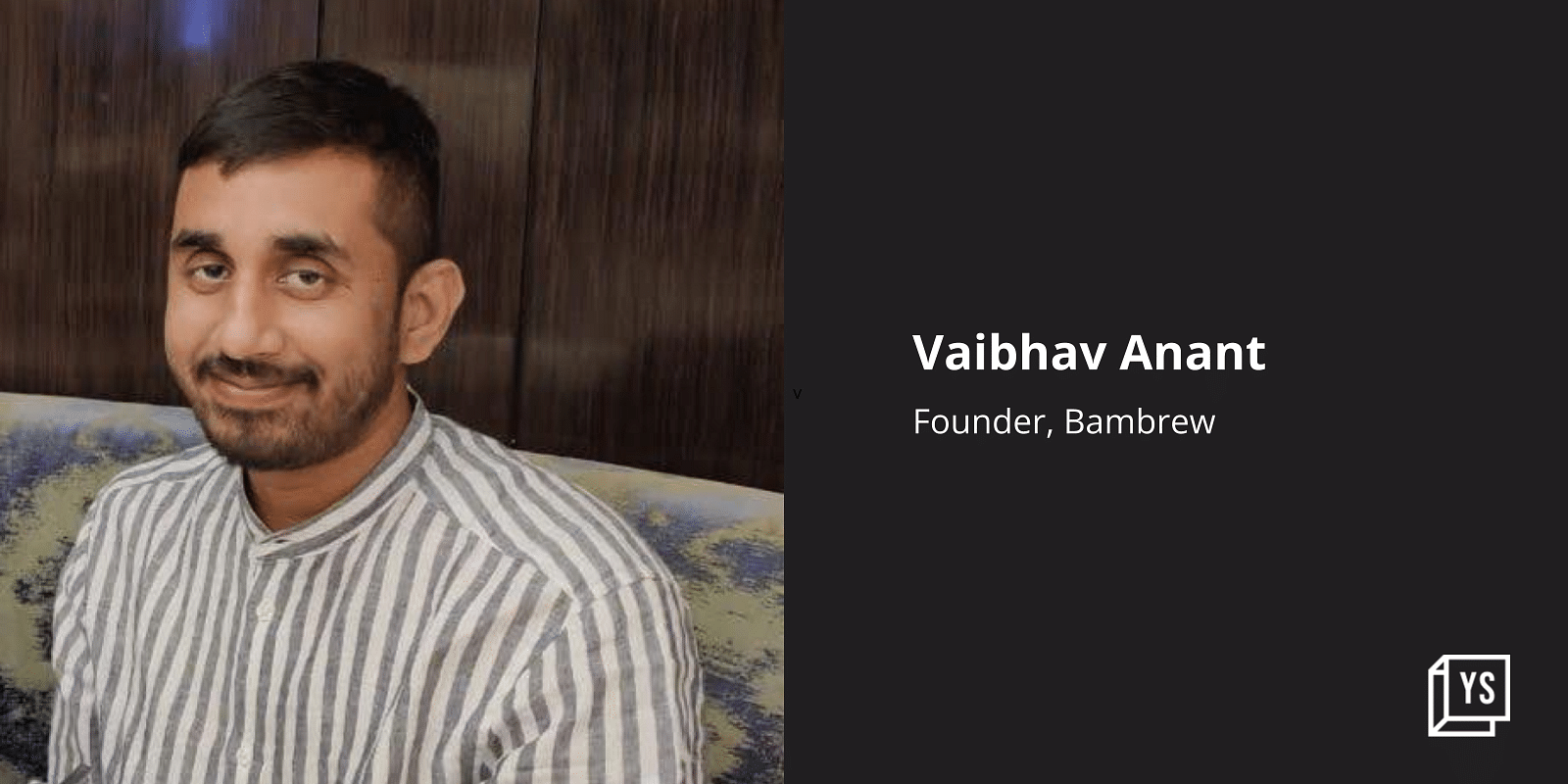As an animal lover and a pet parent, Vaibhav Anant was pained to watch videos of plastic straws being pulled out of a turtle’s nasal track.
Social media platforms are filled with videos about animals getting caught in plastic litter. While some of us watching these videos are moved to make changes in our lifestyle, Vaibhav decided to address the root cause of the problem—single-use plastic.
In 2018, Vaibhav quit his job as Associate Vice-President at a leading edtech company, to launch green packaging startup Bambrew.
“The problem that the world is facing with single-use plastic today is a menace. It is a huge problem across the globe, not only in India. On a regular basis, we consume a lot of micro-plastics unknowingly which was another thing that led me to drive this single-use plastic alternate business,” says Vaibhav.
Bengaluru-based Bambrew uses its proprietary technology to provide alternatives to ecommerce mailer bags, food packaging in the F&B industry, pouches and foldable cartons in the FMCG industry and PVC in the pharmaceutical industry.
The greentech startup uses sustainable materials developed in-house to make these products. It has so far replaced more than 1,000 tons of plastic from the supply chain.
In January, Bambrew raised a pre-series A round of $2.35 million led by Blue Ashva Capital and Supack Industries. The round also saw participation from Mumbai Angels and other angel investors.
“Single-use plastics have been widely used for various applications, even though their negative environmental impact has been well understood for decades. There are simply two parameters that have driven this choice: price and application. Previous attempts at sustainable packaging have failed on one or both of these parameters,” said Satya Bansal, Founder at Blue Ashva Capital at the time of the funding, adding that Bambrew provides cost-effective alternatives to plastic.
An example of sustainable packaging by Bambrew
The product and composition
Plastic contributes to eight percent of India’s total solid waste, with Delhi producing the maximum quantity followed by Kolkata and Ahmedabad, according to Central Pollution Control Board of India (CPCB) reports. In India, around 43 percent of manufactured plastic is used for packaging purposes, most of which is for single use.
While the greentech startup began its journey to find sustainable alternatives for straws, Vaibhav realised that single-use plastic is a much larger problem. This is when he forayed into packaging products.
“We utilised the COVID period as a R&D period, and we came up with multiple alternatives during the two years for e-commerce, pharmaceutical, take-away, food and beverages packaging, and FMCG. Since then, we have constantly been working on innovations,” recalls Vaibhav.
Bambrew produces eco-friendly packaging products that are made out of bamboo, sugarcane, and seaweed. The startup sources its raw materials from tribes in Assam, Tripura, Maharashtra, Madhya Pradesh, Kerala, and Karnataka.
The greentech startup caters to 170 clients across sectors such as hospitality, FMCG, retail, and logistics sectors. Its clientele includes Amazon, Nykaa, 1MG, Puma, Chumbak, Zomato, Myntra, BigBasket, and Zepto among others.
A new dawn
Bambrew says its products can be manufactured by machines that are used to make plastic packaging.
“There were two problems that we wanted to solve—making sustainable products commercially viable and scaling rapidly. What we needed to understand was that we need to develop a product which can be immediately consumed by the market without a major price difference,” Vaibhav explains.
“This is why we decided to work in a hybrid model wherein we partnered with manufacturers who were previously working with plastic,” he adds.
Bambrew has its own set up of manufacturing units where it manufactures 7.5 crore packaging bags each month.
Apart from this, the startup also outsources the production of certain products to other manufacturers. It onboards clients both by approaching some companies and through queries. After the first few clients, Bambrew has experienced the “snowball effect,” Vaibhav says.
“In the initial years, the challenge was to convince the clients to take a trial in their machines because these are expensive machines. They were very hesitant to take a trial, and asked questions like ‘what will happen to my machine?’, and ‘what if the machine breaks down?’. We are also young people, and they would not believe in us,” Vaibhav recalls.
Sustainable packaging by Bambrew
Market and the road ahead
According to a report titled ‘State of India’s Environment 2022’ released by the Centre for Science and Environment (CSE), India generated 25,940 tonnes of plastic waste every day.
“The first and foremost agenda of the company is that how can we solve the problem that our clients are facing in terms of eradicating the use of single-use plastic in the supply chain,” says Vaibhav.
The startup claims that it clocked Rs 77 lakh in revenue in the financial year 2020-21. Bambrew’s revenue grew 13X to Rs 10 crore in FY 2021-22. The startup aims to clock Rs 100 crore in revenue in the current financial year.
After witnessing growth in India, Bambrew now wants to expand its footprint globally. The startup already has a presence in the Middle East, Australia, and the USA.
“In the packaging space, there is always a manufacturer or vendor. We are trying to disrupt this space by creating a brand. Bambrew should resonate with anything and everything sustainable,” says Vaibhav.
Currently, Bambrew is also developing a tech platform aimed at small and medium buyers, who “aren’t able to find the right source for sustainable packaging,” the founder says. This platform would allow purchase of sustainable packaging products in smaller quantities.
“Generally, when you reach out to a manufacturer, they say that my minimum order quantity (MOQ) is 1 lakh or 2 lakh pieces. A small kirana store, which is currently using plastic bags, cannot match that quantity. Either they purchase from a local seller at a very high price or continue using the same plastic bag. Because of our scale, we are able to offer better pricing from mills, and pass on the same benefit to our buyers,” explains Vaibhav.
Bambrew faces competition from startups like Bizongo, and Aggarwal Biotech among others.


![Read more about the article [App Friday] How to monetise your app effectively without disrupting the user experience](https://blog.digitalsevaa.com/wp-content/uploads/2022/02/app-menetisation-1644739440884-300x150.png)



![Read more about the article [Funding alert] What does GIC’s investment in WOW Skin Science mean for Indian D2C brands](https://blog.digitalsevaa.com/wp-content/uploads/2022/05/Manish-1652932926390-300x150.jpeg)



